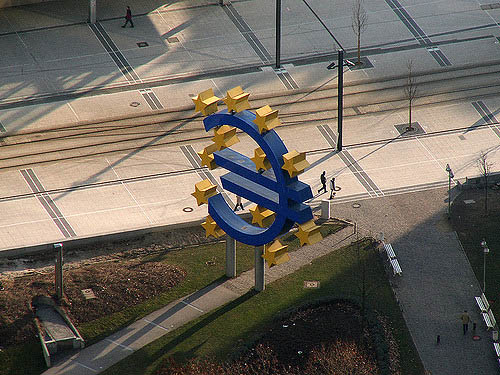
When my colleague Erik Jones told me that Martin Sandbu’s Europe’s Orphan: the Future of the Euro and the Politics of Debt was the best book on the Eurozone crisis, I was sceptical. Usually the analysis that comes from the Anglo-Saxon world does not grasp the complex sociology and politics of the Eurozone. To my surprise, though, Sandbu’s examination of the causes of the crisis and the future paths of the single currency goes a long way to dissect this complexity.
So, yes, I must agree, Sandbu’s is one of the must-read books on the Eurozone crisis, and I do not say this lightly. But let me proceed the old-fashioned way and explain where I agree and where I disagree with Sandbu’s analysis.
I agree that those who blame the single currency for the hardship that we underwent over the past seven years are mistaken. The euro is not the problem, the politics of the euro are. Sandbu’s brilliant second chapter, titled ‘Before the Fall’, unravels the innocence of those who believe life would have been better outside the euro. He makes four convincing arguments:
- Dangerously low borrowing costs would have been available anyway. This was the case in countries outside the Eurozone too.
- Prices and wages diverged between the core and the periphery, but this happened in non-tradable sectors, thus the euro did not erode export competitiveness.
- Huge capital inflows generated large current-account deficits. But this was not bad per se, since the problem is that most of the financing was put into real estate and not industry and high-tech (see Spain).
- While the Eurozone periphery indebted itself in a currency it could not control, it might have done the same outside the Eurozone by borrowing in a hard currency (the euro itself or the Swiss Franc). And even if it had borrowed in its own currency, its balance-of-payments crises might have occurred all the same as its monetary histories do not inspire much confidence.
Sandbu’s main argument is spot on. The biggest mistake in the management of the crisis was to bail out the banks. Greece and Ireland should have defaulted. Greece was insolvent anyway, and the Irish and Spanish taxpayer should not have had to pay for the mistakes of greedy bankers and investors (in Ireland and the rest of Europe). The Eurozone crisis was eminently a crisis of excessive borrowing by the banking sector. We could have saved a lot of money and avoided a lot of pain had we restructured the European banking sector early on. Ironically, Merkel was right when she insisted in the no-bail-out clause. The banks (especially the German and French ones) should have taken the hit. Ultimately, where there is an irresponsible debtor, there also is an irresponsible creditor.
The lesson is clear. When you have a credit-fuelled balance-sheet crisis you need to restructure debt as soon as possible. The Americans did it relatively quickly and that is why they came out of the Great Recession earlier. Unfortunately, the Europeans, led by Germany, focused too much on austerity and not enough on structural reforms, which were certainly needed. This was Merkel’s biggest mistake.
I also agree with Sandbu on the future role of the three big European powers. Germany is right in demanding political centralisation in exchange for fiscal mutualisation. Not least because it does not want to be the leader of the Eurozone. France has always taken this role. But where is the Grande Nation? Sandbu is right in pointing out that if France really wants to create Eurobonds it can do so with its Mediterranean partners. This would put Germany in a corner. Finally, Sandbu is also right when he argues that the UK should join the euro. This is highly controversial at a time of a possible Brexit. But analysed it from a strategic point of view, London needs a stable and united Eurozone, and if this is achieved it might as well want to shape it from the inside.
Where I disagree with Sandbu is as regards the following. Unfortunately, like most orthodox analysts, he does not conceptualise the nature of money. And this is necessary when writing a book about the euro! Sandbu’s work follows the conventional understanding that money is a neutral medium of account, unit of account and store of value. As a declared Chartalist, I must disagree. Money is always a unit of account established, and if necessary imposed, by a political authority. In modern times it is sovereign credit. So Sandbu’s vision that the Eurozone does not need to develop into a fiscal union appears flawed.
This becomes obvious when we look back (or forward) at the possibility of a Greek default. The political economy of debt restructuring is always very tough. Money is a social relationship between a debtor and a creditor, and usually the latter has the upper hand. As Sandbu recognises, Europe has a problem. Its banks are too large and its divided sovereigns are too small. ‘Europe’s top ten banks alone hold assets worth €15 trillion, or 122 per cent of EU GDP; in the United States, that ratio is 44 per cent’ (p. 86). This explains why European leaders decided to bail out the banks. They are just too big to fail, and too powerful to intimidate. This is why the Eurozone needs a stronger and larger sovereign.
Sandbu’s final proposal is to create a Maastricht Treaty 2.0 where the no bail-out rule is properly enforced. In other words, countries should be able to default within the Eurozone. Interestingly, in this Maastricht 2.0 arrangement there would not be a Growth and Stability Pact anymore. Eurozone countries would have levels of debt and annual deficits at their discretion, with the understanding that if they lose the confidence of the international investors, they will not be saved. The apparent beauty of this proposal is that fiscal sovereignty would be restored. For good or bad. If there is a balance-of-payments crisis due to overspending, the adjustment would be swift and brutal.
The question is: would the rest of the Eurozone sit back and watch how Greece or Italy default (bringing down with them one or two European banks) and suffer a devastating sudden stop? No. Relentlessly, history shows that when there is a systemic financial crisis the sovereign steps in to clean up the mess. The Eurozone is no exception. Mario Draghi knows it, because as Sandbu recognises, it was Angela Merkel –not him– who saved the Euro. If the Eurozone wants to have an integrated financial market, with giant transnational European banks, it will need to create a large sovereign to stabilise the system. So, yes, the euro remains an orphan who still misses his parents.


